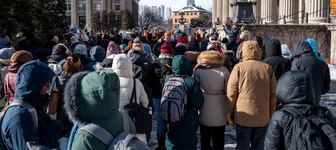The COVID-19 vaccinations statistics in the United States — with total injections reaching the Biden Administration’s 100-day goal of 100 million vaccinations reached in just over half that time — mask critical differences in vaccination levels (and willingness) for some political and demographic groups.
While vaccination rates are rising, the vaccine hesitancy expressed in the latest Economist/YouGov poll has barely changed from the start of the year. One in four Americans (25%) continue to say they will not be vaccinated.
Republicans are nearly four times as likely to reject vaccination (37%) as Democrats (10%); adults under 30 are twice as likely as those 65 and older (32% vs 16%) to say they won’t get vaccinated, and four times as likely to express unsureness about being vaccinated (28% vs 7%).
Black Americans are less likely to have been vaccinated (14%), but their level of hesitancy is lower than among Americans in general (22% this week), and declining. A few weeks ago, two in five Black Americans said they would not get the vaccine.
Changes in vaccine willingness among those 65 and older suggests the possibility of at least some change among the most hesitant. Before vaccines were available for them, two in five senior citizens claimed they would not get vaccinated or weren’t sure about it. That number has dropped by nearly half to 23% as they have been routinely scheduled for vaccine appointments in the last few months – and nearly half (47%) have already received the vaccine.
But while the growing acceptance of the vaccine by senior citizens can be called a success story, others who now reject the vaccine may be harder to move. Asked in the previous week’s poll why they won’t be vaccinated, many expressed doubts in the seriousness of the virus, and other rejected vaccinations in principle, or worried that this vaccine was dangerous. Very few said they had an underlying condition that means they could not have been vaccined.
Still, the increase in those vaccinated since the start of the year is dramatic, especially among those 65 and older.
When Americans think COVID-19 vaccines will be available to them
Most of those who are not yet vaccinated, but plan to be (or are at least thinking about it) believe there will be a vaccine for them soon. Two-thirds of Americans (67%) think it will be by this summer, and 80% say it can happen by the end of this calendar year. Just 4% expect to have to wait until next year or beyond.
Two in three (68%) have seen or heard something about the president’s March 11 address on COVID-19. By two to one (61% vs 31%) this group approved of how President Biden performed. His overall handling of the pandemic has been a strong positive for Joe Biden. By 55% to 33%, Americans approve of how he has handled it.
No doubt the recent speed of vaccinations (as well as the COVID relief bill) has helped the president. As recently as the beginning of February, more than half the public believed the distribution of the COVID-19 vaccine was too slow. Now, as vaccinations are taking place, just 36% still say the distribution is too slow.
Americans also expect the president to meet the promises he made in his speech. Three in five (61%) expect that all adults “should be able to get in line” for a vaccine by May 1, and even more (69%) expect they will be able to socialize with family and friends by the Fourth of July.
Republicans are more skeptical than Democrats that the May 1 vaccine availability deadline will be reached (46% of Republicans say it’s likely verses 83% of Democrats), but they do expect to be able to socialize by July 4 (64%). For many Republicans, President Biden’s deadline comes late, as more than a third of Republicans (38%) say it is safe to go without a mask today, and 42% say it is safe to socialize with friends and family without socially distancing right now.
Democrats are far more cautious. Just 2% believe it’s safe to go without a mask today, and only 3% say it is safe to socialize without socially distancing.
Related: Is it acceptable to take a COVID vaccine that will be thrown out?
See the toplines and crosstabs from this Economist/YouGov poll
Methodology: The Economist survey was conducted by YouGov using a nationally representative sample of 1,500 US Adult Citizens interviewed online between March 13 - 17, 2021. This sample was weighted according to gender, age, race, and education based on the American Community Survey, conducted by the US Bureau of the Census, as well as 2016 Presidential vote, registration status, geographic region, and news interest. Respondents were selected from YouGov’s opt-in panel to be representative of all US citizens. The margin of error is approximately 2.7% for the overall sample
Image: Getty









